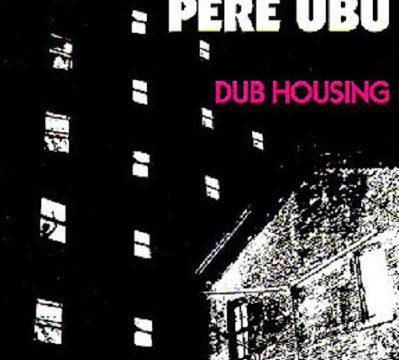ED. NOTE: From the archives (AKA my email inbox), the-solute.com proudly presents one last look at 1978 (originally scheduled for November 30th).
What to do, in 1978, if you were a young man out in the real world, in real time? Maybe, if you lived in a sunny place with your bros, you’d start a band devoted to and exalting in fun. Or maybe, if you lived in a rotting and dying city, you’d rebel in murderous fantasy. There were options!
The young men of Pere Ubu were living in Cleveland, by all accounts a place of urban decay that could give the outskirts of Pittsburgh a run for their money. But they loved their wasteland. Or at least they spoke its language and wanted to make their art with it. Their music wasn’t aspirational fantasy or particularly “fun” in the sense rock usually takes (although they did write “Ubu Dance Party”). It’s abstract and domestic. The devil and Caligari can pop up but so can buses, windows, tables, chairs. It’s noise and melody, playfulness and terror.
Guitarist Tom Herman slashed and skritched, drummer Scott Krauss drove it forward and held the backbeat. Bassist Tony Maimone bounced and bubbled, a reggae cauldron. Allen Ravenstine garbled and whined and choked noise from his synths, hissing into the grooves, becoming the melodies. And David Thomas made sounds with his mouth, his drunken slurs and demented yawp making David Byrne sound like Michael Bolton. The parts interlocked more than aligned, surfacing and subsuming as needed.
After several singles that are brilliant in their own right (collected on the essential Terminal Tower), the band released their debut at the beginning of the year. It opens with a high-pitched emergency test pattern almost designed to have people slapping their stereos before lurching into a Stooges-bitten riff and Thomas wailing about not dating or banging a girl, but creating a non-alignment pact with her. Besides the Stooges, the Seeds and even ? and the Mysterians are touchstones: the album has more overt rock than subsequent records and even guitar solos. “Street Waves” is their Beach Boys number, riding the asphalt instead of the surf with a girl and getting gone.
But even that has a break midway through, the waves lapping ominously. “Sentimental Journey” is a man of sorrow (or insanity? just boredom?) wandering through his house, glass smashes and synths squiggle as Thomas intones “home” with the unnameable longing of someone who isn’t there. But he is there. There is contradiction at the heart of these songs — the Cultural Revolution becomes a love story, that non-alignment pact is a break-up, the title track invents a modern dance that its main character will never get. The final track, “Humor Me,” says it: “What a great big world to be drowned in.” It’s just a joke, Thomas insists over and over as the band lays down a stark, blasted apocalypse behind him (the first time I read Watchmen, this song slammed into my head as soon as I saw the first pages of the final chapter), ghouls coming to claim their due. It’s a joke! But humor me.
By the end of the year, they had pulled the contradiction further. Second album Dub Housing is poppier: Maimone’s bass leads the way and opener “Navvy” is outright perky — “Boy THAT sounds swell!” Thomas squeals. (Its opening line about arms and legs going flip flop, flip flop, that 30 years on would be jacked by Trent Reznor surely portends no danger ahead, right?). The music of “Ubu Dance Party” is indeed danceable with a chorus of “dah-dee dah dahs!” inviting a singalong as well. “I did not see the darkened sky, I did not feel the pressure drop” Thomas jovially tells us. This is more than the light music/dark lyrics play-off that pop will pull off all the time though — this is both light and dark at the same time. They do not deny each other but exist together, contradiction as concoction.

